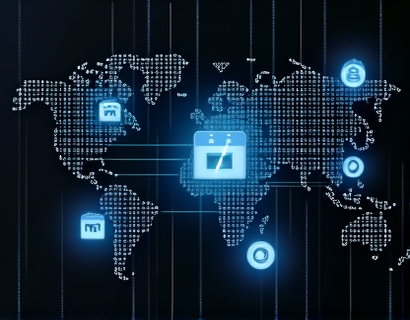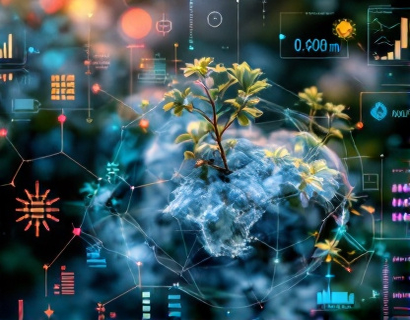Autonomous AI Agents: Streamlining Continuous Objectives for Business and Personal Productivity Boost
In the rapidly evolving landscape of technology, autonomous AI agents have emerged as a pivotal force in enhancing productivity across various sectors. These intelligent systems are designed to operate with minimal human intervention, continuously managing tasks and objectives to ensure that both businesses and individuals can concentrate on their core activities. The integration of autonomous AI agents represents a significant leap forward in the quest for efficiency and competitiveness in today's fast-paced world.
The concept of autonomous AI agents revolves around the ability of machines to perform tasks that traditionally required human oversight and decision-making. By leveraging advanced algorithms and machine learning techniques, these agents can adapt to new situations, learn from past experiences, and optimize their performance over time. This capability is particularly valuable in environments where tasks are repetitive, time-consuming, or require a high degree of precision.
Enhancing Business Operations
For businesses, the adoption of autonomous AI agents can lead to substantial improvements in operational efficiency. One of the primary benefits is the automation of routine tasks, such as data entry, report generation, and customer service inquiries. By offloading these tasks to AI agents, human employees are freed up to focus on more strategic and creative work, driving innovation and growth.
Consider a manufacturing company where autonomous AI agents monitor production lines in real-time, detecting anomalies and initiating corrective actions automatically. This not only reduces downtime but also ensures consistent product quality. Similarly, in the finance sector, AI agents can process transactions, identify fraudulent activities, and generate financial reports, significantly reducing the risk of human error and increasing the speed of operations.
Personal Productivity Gains
On an individual level, autonomous AI agents can transform personal productivity by managing daily tasks and reminders, scheduling appointments, and even providing personalized recommendations based on user preferences and behavior. For professionals, AI agents can handle email management, calendar organization, and task prioritization, allowing individuals to maintain a higher level of focus and efficiency throughout their workday.
Take, for example, a busy executive who uses an AI agent to manage their email inbox. The AI can categorize emails, prioritize urgent messages, and even draft responses based on the content and context. This not only saves time but also ensures that important communications are handled promptly and effectively.
Continuous Objective Management
A key feature of autonomous AI agents is their ability to manage continuous objectives, ensuring that tasks are completed efficiently and effectively over time. These agents can set and adjust goals based on real-time data, adapt to changing priorities, and optimize resource allocation. This dynamic approach to task management is particularly beneficial in complex and unpredictable environments.
For instance, in project management, an AI agent can continuously monitor project progress, identify potential bottlenecks, and adjust timelines and resource assignments accordingly. This proactive management helps in meeting deadlines and maintaining project quality, even when unforeseen challenges arise.
Strategies for Implementation
To harness the full potential of autonomous AI agents, businesses and individuals need to adopt strategic approaches to implementation. Here are some key strategies to consider:
- Identify Core Tasks: Start by identifying tasks that are repetitive, time-consuming, or prone to human error. These are ideal candidates for automation by AI agents.
- Choose the Right Tools: Select AI solutions that align with your specific needs and integrate seamlessly with existing systems. Consider factors such as scalability, customization, and user-friendliness.
- Train and Monitor: Provide initial training data to the AI agents to ensure they understand the tasks and objectives. Continuously monitor their performance and make adjustments as necessary to improve accuracy and efficiency.
- Foster a Collaborative Environment: Encourage a culture where human employees and AI agents work together harmoniously. This involves setting clear roles and responsibilities and ensuring that AI insights are effectively communicated and utilized.
- Focus on Continuous Improvement: Regularly review the outcomes and processes managed by AI agents. Use feedback loops to refine algorithms and enhance performance over time.
Challenges and Considerations
While the benefits of autonomous AI agents are clear, there are also challenges and considerations that must be addressed. One of the primary concerns is the initial investment required to implement these systems. However, the long-term savings in labor costs and increased productivity often justify the upfront expenses.
Another consideration is the potential for job displacement. While AI agents can automate routine tasks, they also create new opportunities for human employees to focus on higher-value activities. Organizations should invest in reskilling and upskilling programs to prepare their workforce for the evolving job landscape.
Data security and privacy are also critical issues. AI agents handle sensitive information, and ensuring the protection of this data is paramount. Implementing robust security measures and adhering to regulatory standards are essential steps in mitigating risks.
Future Trends
The future of autonomous AI agents is promising, with ongoing advancements in AI technology paving the way for even more sophisticated and capable systems. Here are some trends to watch:
- Increased Autonomy: AI agents will become more self-sufficient, requiring even less human intervention and capable of handling more complex tasks.
- Enhanced Learning Capabilities: Machine learning algorithms will improve, enabling AI agents to learn faster and adapt more effectively to new situations.
- Integration with IoT: The Internet of Things (IoT) will play a significant role in expanding the capabilities of AI agents, allowing them to interact with and control physical devices and systems.
- Ethical AI: There will be a greater emphasis on developing AI systems that are transparent, fair, and aligned with ethical standards, addressing concerns around bias and accountability.
As these trends evolve, businesses and individuals will have access to more advanced tools that further enhance productivity and efficiency. The key will be to stay informed and adapt to these changes, leveraging the power of autonomous AI agents to achieve strategic objectives.
Conclusion
Autonomous AI agents represent a transformative force in the realm of productivity, offering significant benefits for both businesses and individuals. By automating routine tasks, managing continuous objectives, and providing valuable insights, these intelligent systems enable users to focus on what truly matters—driving innovation, growth, and success. As technology continues to advance, the potential of autonomous AI agents will only grow, making them an indispensable tool in the modern world.











































